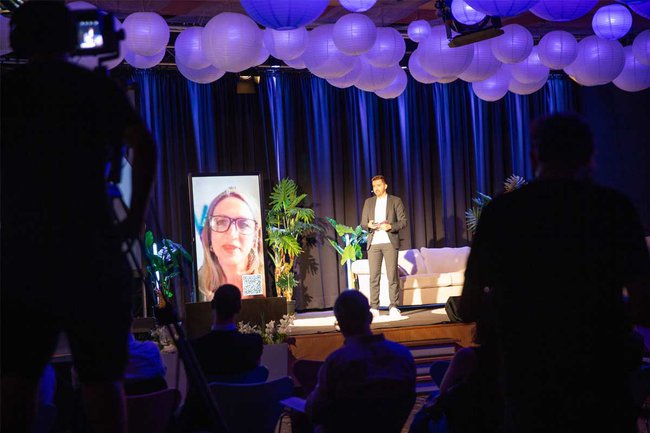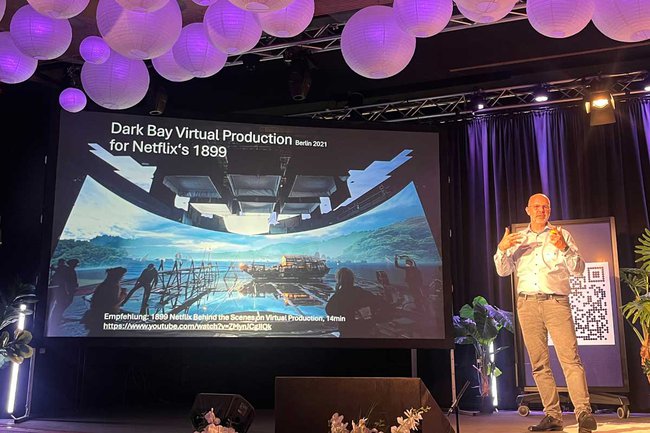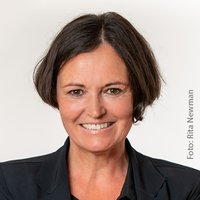How TV Production Is Changing
International Industry Leaders Discuss at St. Pölten UAS’ c-tv Conference

On 5 June, the St. Pölten University of Applied Sciences once again became a venue for the film and television industry to come together. The focus of the ‘c-tv Conference’ organised by the Media Technology degree programme was on international providers of technical service and trends in the global market of formats. The event’s programme, which interested persons could follow both on site at the Campus St. Pölten and online at DerStandard.at/etat, presented inspiring keynotes, hands-on best practice examples, and lively discussions with industry experts. The c-tv Conference is available on demand on the official website of c-tv.
From virtual production with LED walls (which have long been common for big TV productions) to AI-supported workflows or cloud-based collaboration: Today, technical service providers set global standards and make productions more flexible, faster, and more creative. This allows even small teams and local players to gain access to the international market and assert themselves in the global competition. Despite the boost in innovation, however, the industry is also facing major challenges.
Blurred Borders between Linear TV, Streaming, and Social Media
“In 2025, we experience how the lines between linear TV, streaming, social media, and gaming are becoming more and more blurred”, says Rosa von Suess, head of the creative content channel c-tv and Academic Director of the bachelor degree programme Media Technology and the master-level continuing education programme Film, Media & TV at the St. Pölten UAS. “At the same time, new formats are prospering: short-form storytelling, documentary hybrids for mobile platforms, and cross-border co-productions connecting global and local markets. The industry is becoming more diverse, sustainable, and international. However, budgets are shrinking, while costs are rising at the same time. The economic situation is tense. Many productions are relocated abroad because they are cheaper to realise there.” A shortage of specialists causes further complex challenges.
 Copyright: Rosa von Suess
Copyright: Rosa von Suess
Virtual Production Technologies
“Virtual production technologies will gain strongly in importance in future – in many cases, though, there is a lack of sufficiently qualified specialists. This field holds an enormous development and career potential for prospective experts”, says Markus Zeiler, former ARRI Executive Board member and Managing Director Europe and APAC of MBS Equipment Company, the world’s biggest studio operator and lighting equipment hire company. He showed how virtual production technologies are permanently changing the international film production.
The newly initiated funding FISA+ for international productions in Austria resulted in an increased need for talents. Based on the examples of the cinema film “Cliffhanger 2” and the series “Nine Perfect Strangers” with Nicole Kidman – which were made in Salzburg, Upper Austria, and Tyrol, among other places – he impressively demonstrated the contribution of Austrian expertise to large-scale productions.
Trend: Producers Address Audiences Directly
Clare Thomson, board member of the international media consulting firm K7, provided insights into global trends in the TV and film industry: Producers are increasingly addressing their audience directly – and the audience is becoming their competitor at the same time. “They are looking for new ways to disseminate their content”, explains Thomson. Despite this dynamic, the format export market remains stable: There are approximately 1,500 adaptations of 450 reality formats such as “MasterChef” or “The Voice” worldwide.
The industry reacts by adjusting: It relies on reputation, linguistic competence, and cost-efficient teams. Ownerships questions regarding big broadcasters remain open and new financing models and investments from the private and brand sector become increasingly important. Advertising-financed streaming is growing more widespread, thus increasing the pressure on traditional TV, while AI gradually alters production processes.
Further Highlights from the Media Sector
Alexander Brozek, CEO of Camcat Systems
Friedrich Mose, Documentary filmer
Oliver Kilian, Customer Care, AV Stumpfl/Pixera
Patrick Mandl, Product Manager “Video”, Riedel Communications
Yassmine Najime, Head of Production, VAST
Students Design c-tv Conference
The c-tv Conference was organised and carried out by fourth-semester students of the Media Technology degree programme. The two bachelor students Cathy Pfeiffer and Markus Valant hosted the programme which nearly 700 viewers followed via live stream.
“At the c-tv Conference, students produce under real conditions and in line with the highest quality standards. They realised a comprehensive live show event format and cross-media content. It is splendid that we get to share these results directly with renowned industry experts – this creates visibility, recognition, and valuable feedback”, says Supervising Producer Felix Blasinger from the St. Pölten UAS.
A special highlight for the students was the greeting from Eva-Maria Holzleitner, Federal Minister for Women, Science and Research, who emphasised that research and innovation are essential for the media sector, and that the c-tv Conference makes an important contribution to this.
The c-tv Conference was realised with technical support from domotion, AV-Professional, AVStumpfl / Pixera, and Riedel Communications.
The event has long established itself as an important platform for exchange on recent developments in the theory and practice of the broadcasting and media sector. At the same time, it gives students the chance to discover exciting job prospects, while media professionals have the opportunity to purposefully recruit young talents for the future.
The c-tv Conference is available for streaming on the official website of c-tv and on DerStandard.at/etat. A summary of the Conference will be shown on ORF III on 20 June and in the media library of ORF ON.

FH-Prof. Mag. Dr. Rosa von Suess
Academic Director Media Technology (BA) Lecturer Course Leader Film, TV and Media - Creation and Distribution (MA) Department of Media and Digital Technologies Head of c-tv